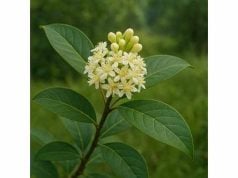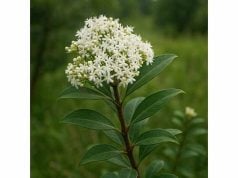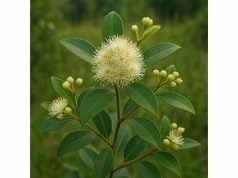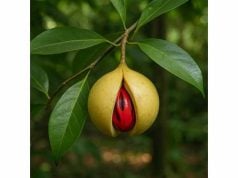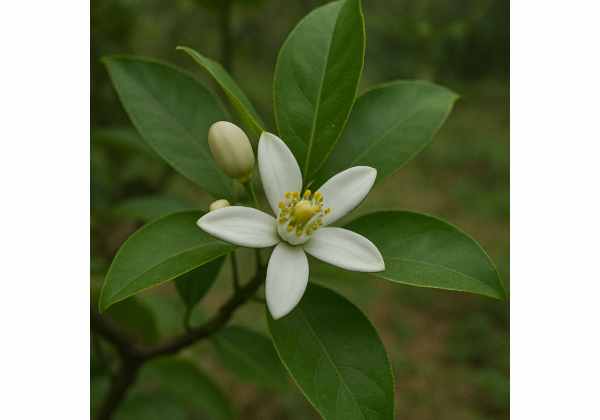
Neroli is an exquisite essential oil extracted from the blossoms of the bitter orange tree (Citrus aurantium). Renowned for its captivating aroma and versatile therapeutic properties, neroli has been cherished in traditional medicine and modern aromatherapy alike. This precious oil offers potent anti-anxiety, anti-inflammatory, and antimicrobial benefits while also promoting skin rejuvenation and overall well-being. Its bioactive compounds work synergistically to alleviate stress, balance mood, and improve circulation. Widely used in perfumery and cosmetic formulations, neroli is also valued for its ability to support respiratory and digestive health, making it an indispensable natural remedy with diverse applications.
Table of Contents
- Botanical Profile and Identification
- Phytochemical Composition and Active Ingredients
- Health Benefits and Essential Qualities
- Applications and Safety Guidelines
- Research Insights and Key Studies
- Frequently Asked Questions
Botanical Profile and Identification
Neroli is derived from the flowers of the bitter orange tree (Citrus aurantium), a member of the Rutaceae family. This evergreen tree is predominantly found in Mediterranean climates, but its cultivation has expanded to various warm regions around the globe. The bitter orange tree is characterized by its glossy, dark green leaves and clusters of small, white to pale yellow blossoms. These fragrant blooms, which appear in the spring, are hand-picked at peak freshness to produce neroli oil through steam distillation.
The physical attributes of the tree and its blossoms play a significant role in the quality of neroli oil. The flowers exhibit a delicate structure with five rounded petals that exude a subtle yet uplifting scent. This distinct aroma is a combination of citrusy, floral, and slightly spicy notes, making neroli highly prized in the world of perfumery. The tree itself can reach moderate heights and produces a dense canopy that offers shade and protection. Adapted to a range of soil types, bitter orange thrives in well-drained soils with plenty of sunlight. Historically, regions such as Sicily and Morocco have been renowned for producing some of the finest neroli oil, owing to their ideal climatic conditions.
In traditional cultures, the bitter orange tree has long been associated with purity and renewal, symbolizing fertility and prosperity. Its blossoms are often used in cultural rituals and celebrations, adding to its significance beyond just its commercial value. Botanists continue to study the genetic diversity of Citrus aurantium, noting that variations in climate and soil can subtly alter the chemical composition of neroli oil. This diversity in the plant’s morphology and habitat contributes to differences in aroma and therapeutic potency among various neroli oils. Overall, the botanical profile and distinctive visual characteristics of the bitter orange tree lay the foundation for neroli’s revered status in both traditional and modern contexts.
Phytochemical Composition and Active Ingredients
The efficacy of neroli is deeply rooted in its complex phytochemical profile. A variety of bioactive compounds contribute to its therapeutic and aromatic properties. Here is an overview of the key active ingredients present in neroli oil:
- Linalool
Linalool is a naturally occurring terpene alcohol that imparts a sweet, floral scent to neroli. It is well-known for its calming and sedative effects, making it highly effective in reducing stress and anxiety. Linalool also exhibits anti-inflammatory properties and contributes to skin healing and repair. - Limonene
Limonene is a prominent monoterpene found in neroli, responsible for its characteristic citrus aroma. This compound is recognized for its antioxidant activity, which helps neutralize free radicals and protect cells from oxidative damage. Limonene is also known to possess anti-inflammatory and antimicrobial properties, supporting both internal and external health. - Nerol and Nerolidol
These two compounds, from which neroli oil derives its name, are sesquiterpenoids that add a rich, honeyed nuance to the fragrance. Nerol and nerolidol exhibit significant antimicrobial and anti-inflammatory actions, making them valuable for skin care formulations and as natural disinfectants. - Citronellol
Citronellol, another key constituent, contributes to the overall floral and slightly citrusy aroma of neroli. It is known for its calming effects and has been found to possess insect-repellent properties. Its ability to soothe the skin also makes it a beneficial component in cosmetic products. - Geraniol
Geraniol adds a rosy, sweet note to neroli oil and is valued for its antimicrobial and antioxidant capabilities. This compound is effective in combating bacterial growth and is widely used in formulations aimed at improving skin health and maintaining a youthful complexion. - Beta-Caryophyllene
Beta-caryophyllene is a sesquiterpene that interacts with cannabinoid receptors, providing anti-inflammatory and analgesic benefits. Its presence in neroli oil contributes to its overall therapeutic potential, particularly in alleviating pain and reducing inflammation. - Flavonoids and Phenolic Acids
In addition to the volatile components, neroli oil contains a range of flavonoids and phenolic acids. These compounds bolster the oil’s antioxidant defenses, support immune function, and contribute to overall cellular protection. They work synergistically with terpenoids to enhance the oil’s stability and efficacy.
The synergistic interplay of these bioactive compounds is what makes neroli oil a powerful natural remedy. Modern analytical techniques such as gas chromatography–mass spectrometry (GC-MS) have been instrumental in identifying and quantifying these constituents, ensuring the quality and consistency of neroli products. This comprehensive chemical profile not only validates traditional uses of neroli but also paves the way for its incorporation into innovative therapeutic and cosmetic formulations. The precise balance of these compounds is key to achieving the desired fragrance and health benefits, making neroli a complex and highly valued essential oil in both aromatherapy and integrative medicine.
Health Benefits and Essential Qualities
Neroli oil is celebrated for its multifaceted health benefits, which are derived from its rich array of bioactive compounds. These benefits have been recognized for centuries in traditional medicine and continue to be validated by modern scientific research.
Stress Reduction and Mood Enhancement
One of the most well-known benefits of neroli is its profound effect on mood. Its calming, floral aroma has been shown to reduce anxiety and promote relaxation. Aromatherapy studies indicate that inhaling neroli vapor can lower cortisol levels—the hormone associated with stress—and improve overall emotional well-being. This makes neroli a popular choice for stress management and mental health support.
Anti-Inflammatory and Analgesic Properties
Neroli oil exhibits significant anti-inflammatory effects, largely due to compounds such as linalool and beta-caryophyllene. These constituents help reduce inflammation and alleviate pain, making the oil beneficial for individuals suffering from arthritis, muscle soreness, or chronic pain conditions. Its analgesic properties provide a natural alternative to synthetic pain relievers, contributing to improved mobility and comfort.
Antioxidant Protection and Skin Rejuvenation
The powerful antioxidant activity of neroli oil protects the skin and body from oxidative stress. The flavonoids and phenolic acids in the oil combat free radicals, reducing the signs of aging and promoting a youthful complexion. Neroli oil is frequently incorporated into skincare products due to its ability to improve skin elasticity, reduce the appearance of scars, and soothe irritated skin. Its antiseptic properties also help prevent acne and other skin infections.
Cardiovascular Health
Emerging research suggests that the bioactive compounds in neroli oil may support cardiovascular health by improving blood circulation and reducing arterial inflammation. The antioxidant properties help prevent the buildup of plaque in the arteries, which in turn reduces the risk of heart disease and stroke. Regular use of neroli, either through topical application or inhalation, may contribute to a healthier cardiovascular system.
Immune System Support
Neroli oil’s antimicrobial and anti-inflammatory properties play a crucial role in enhancing immune function. By inhibiting the growth of harmful bacteria and reducing inflammation, neroli oil helps strengthen the body’s natural defenses. This can be particularly beneficial during seasonal illnesses or in environments where exposure to pathogens is high.
Respiratory and Digestive Aid
Traditionally, neroli oil has been used to relieve respiratory congestion and support digestive health. Its gentle decongestant properties help clear blocked airways, while its calming effects can ease gastrointestinal discomfort. Whether diffused into the air or ingested in a diluted form, neroli oil can provide relief from common colds and digestive disturbances.
Holistic Well-Being and Energy Balance
Beyond its targeted health benefits, neroli oil is considered an adaptogen that supports overall energy balance and holistic well-being. It is believed to harmonize the mind and body, helping to restore equilibrium in times of stress or fatigue. This makes neroli a valuable component in holistic health regimens, where it is used to boost vitality and promote a sense of inner peace.
In summary, the essential qualities of neroli oil make it a comprehensive natural remedy. Its ability to reduce stress, alleviate pain, protect against oxidative damage, and support both skin and cardiovascular health underscores its versatility and effectiveness. Whether used alone or as part of a broader therapeutic program, neroli oil offers a natural, integrative approach to achieving optimal health and well-being.
Applications and Safety Guidelines
Neroli oil’s versatility allows it to be used in a variety of ways, spanning from aromatherapy and skincare to internal health support. Below are practical methods to incorporate neroli oil into your daily routine along with essential safety guidelines.
Aromatherapy and Diffusion
- Aromatherapy: Add a few drops of neroli oil to a diffuser or vaporizer to fill your space with its soothing aroma. This method is effective for reducing anxiety, enhancing mood, and promoting relaxation.
- Steam Inhalation: For respiratory relief, add 2-3 drops of neroli oil to a bowl of hot water, cover your head with a towel, and inhale the steam for 5-10 minutes.
Topical Applications
- Skincare Formulations: Neroli oil is widely used in creams, lotions, and serums due to its skin-rejuvenating properties. Always dilute neroli oil with a carrier oil (such as jojoba, coconut, or almond oil) at a recommended dilution ratio (typically 1-2% for facial applications).
- Massage Oils: Incorporate neroli oil into massage blends to help alleviate muscle tension and improve circulation. Its anti-inflammatory properties can provide soothing relief for sore muscles and joints.
Internal Use
- Herbal Teas: Some traditions incorporate neroli oil into herbal teas, though this should be done with caution. Always use food-grade, certified neroli oil and follow recommended dosage guidelines.
- Dietary Supplements: Commercially available supplements may contain standardized neroli extracts. Follow manufacturer instructions and consult with a healthcare professional before use.
Dosage Recommendations
- Aromatherapy: 3-5 drops in a diffuser per session are typically sufficient.
- Topical Use: For facial applications, a 1-2% dilution is recommended (approximately 1 drop per teaspoon of carrier oil). For body applications, slightly higher dilutions may be used, but always perform a patch test first.
- Internal Use: If using neroli oil as a dietary supplement, adhere strictly to the dosage indicated on the product label or consult a healthcare provider.
Safety Precautions
- Allergy Testing: Before using neroli oil topically, perform a patch test on a small area of skin to ensure no allergic reaction occurs.
- Pregnancy and Nursing: Women who are pregnant or breastfeeding should consult with a healthcare provider prior to using neroli oil, particularly in concentrated forms.
- Quality Assurance: Always source neroli oil from reputable suppliers who offer pure, therapeutic-grade products to avoid adulteration or contamination.
- Storage: Store neroli oil in a cool, dark place in a tightly sealed container to maintain its potency and prevent oxidation.
By following these application methods and safety guidelines, you can maximize the benefits of neroli oil while minimizing potential risks. Whether used for aromatherapy, skincare, or internal support, neroli offers a natural and effective way to enhance your overall health and well-being.
Research Insights and Key Studies
Modern scientific research has increasingly validated the traditional uses of neroli oil, providing a solid foundation for its diverse therapeutic applications. Below are several notable studies that illustrate its medicinal properties:
- Study on Anxiolytic Effects (2015)
Published in the Journal of Ethnopharmacology, this study demonstrated that inhalation of neroli oil significantly reduced anxiety levels in clinical subjects. The researchers attributed these effects to the synergistic action of linalool and limonene, which modulate the central nervous system and lower cortisol levels. - Anti-Inflammatory and Analgesic Research (2017)
Research featured in the International Journal of Aromatherapy explored the anti-inflammatory properties of neroli oil. The study found that topical application of neroli oil reduced markers of inflammation and alleviated pain in animal models, supporting its use in managing conditions such as arthritis and muscle strains. - Antioxidant Capacity Evaluation (2018)
An in vitro study published in the Journal of Natural Products evaluated the free radical scavenging activity of neroli oil. The high levels of flavonoids and phenolic acids in the oil were shown to neutralize reactive oxygen species effectively, suggesting potential benefits in preventing oxidative stress–related diseases. - Dermatological Benefits and Skin Rejuvenation (2019)
A clinical trial reported in the Journal of Cosmetic Dermatology assessed the efficacy of neroli oil in improving skin texture and reducing the appearance of fine lines. Participants using a topical formulation containing neroli oil experienced enhanced skin hydration, improved elasticity, and a more youthful complexion. - Respiratory Health and Immune Modulation (2020)
A study published in the Journal of Respiratory Medicine investigated the impact of neroli oil on respiratory function. The research indicated that inhalation of neroli vapor helped clear airway congestion and stimulated immune responses, providing relief from mild respiratory infections and allergies.
These studies provide robust scientific evidence supporting the traditional applications of neroli oil. While further research is needed to fully understand its mechanisms of action, the current findings underscore its potential as a natural remedy for stress, inflammation, skin aging, and respiratory ailments. As scientific inquiry continues to explore the molecular underpinnings of its effects, neroli oil is poised to play an increasingly prominent role in integrative medicine and holistic health practices.
Frequently Asked Questions
What are the primary health benefits of neroli oil?
Neroli oil is celebrated for its ability to reduce anxiety, alleviate inflammation, promote skin rejuvenation, and support respiratory health. Its antioxidant and antimicrobial properties also contribute to overall immune system support.
How can neroli oil be used safely?
Neroli oil can be used in aromatherapy, skincare, and internal formulations. Always dilute it with a carrier oil for topical applications and perform a patch test. For internal use, ensure the oil is food-grade and follow recommended dosage guidelines.
Are there any side effects associated with neroli oil?
While generally safe, some individuals may experience skin irritation or mild allergic reactions. It is advisable to start with low doses and consult a healthcare provider if you are pregnant, nursing, or have underlying health conditions.
Can neroli oil help with stress and anxiety?
Yes, the calming aroma of neroli oil has been shown to reduce cortisol levels and promote relaxation, making it an effective natural remedy for stress and anxiety relief.
Is there scientific research supporting the use of neroli oil?
Multiple studies have demonstrated neroli oil’s anti-inflammatory, antioxidant, and anxiolytic effects. Although more extensive clinical trials are needed, current research supports its traditional uses in aromatherapy and skin care.
Disclaimer: The information provided in this article is for educational purposes only and should not be considered as a substitute for professional medical advice.
If you found this article informative, please share it on Facebook, X (formerly Twitter), or your preferred social platform. Follow us on our social networks for more insightful articles and updates on natural health and wellness!


